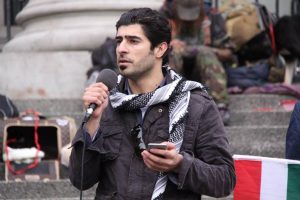Student Raises Awareness for Kurdish Struggles
The objective of the project, Kurdish Voice, is to defend the human rights of Kurdistan community and globally educate the confluence of challenges they face while seeking justice and stability. The project is not only meant for students here at UW and Americans, but also for the people of Kurdistan (also known as Kurds). Kurdistan is a mountainous area located where the borders of Iran, Iraq and Turkey meet. The Kurds do not have an official homeland or country. For years the goal has been to create an independent Kurdistan. However, the surrounding states will not allow the Kurds to have an independent state. As a result, the majority of Kurds reside in various locations across the Middle East. The minority community consists of approximately 50 million people. After having experienced decades of deportation, torture, and killings the Kurds continue to bear hardships. They have continuously resisted against the restriction of speaking the Kurdistan language and practicing the culture. “Here you have a nation of tens of millions of people that speak their own language and have their own quasi-capital, yet they are routinely ignored and subjugated by the five different nation states they occupy,” said former ASUWT staff member, Seth Lundgaard. Abdulkader shared his own experience while living in Kurdistan, and the obstacles he had to overcome living an unstable lifestyle: “During the Gulf War in 1991, Saddam Hussein attacked the Kurds in Northern Iraq (where the majority of Kurds resided). Iraq forced the community of Kurds to flee to Iran. Iran did not accept us so we fled to Turkey, and Turkey didn’t Kurdish refugee. Then we finally ended up in Syria where my family and I stayed for 7 years in a refugee camp. We had no shelter, no water, and we fled by foot through the mountains during the winter. At the end of 1997, we got accepted to move to the United States.” This was not only Adbulkader’s personal experience, but the experience of various Kurds who fled by foot from state to state as well. The Kurdish community still struggles with the same issues such as that in 1991, but for different reasons. Today, the Kurds are continuously attacked and killed by various groups because of their ethnicity. The project focuses on the Northwest community—Seattle, Vancouver, and Portland. It’s mainly made possible by social media. Abdulkader utilizes Facebook, Twitter, and a blog to spread the word. In addition to social media, demonstrations are organized as often as possible. Friday, September 12th, Abdulkader held a peaceful protest at Westlake Center, condemning Turkey’s aggression towards the Kurds. Abdulkader says he organized and funded the three hundred dollar protest himself. Despite the cost, he strives to organize as many protests as possible to bring about global change and to attract more people who are unaware of Kurdish Voice. Activist Jonathan Weaver shared how he was introduced to Kurdish Voice and his views on the project, “I heard about the project through the Facebook page, having seen another friend add the group on his feed. I have long been interested in both domestic and foreign policy. What encouraged me to join was the overall message of the page and the people of its social media community.”





